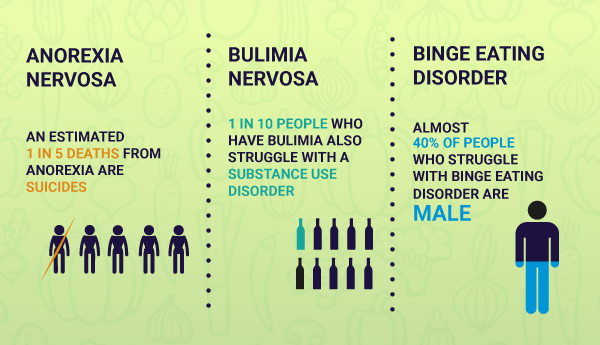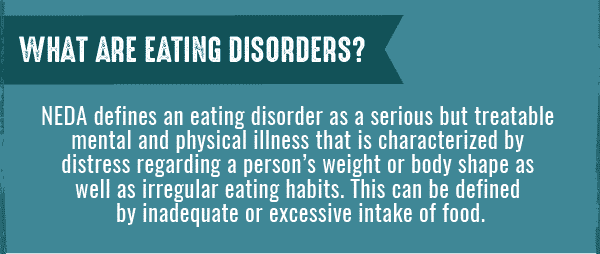How Eating Disorder Recovery can Save You Time, Stress, and Money.
Wiki Article
Everything about Eating Disorder Recovery
Table of ContentsEating Disorder Recovery Fundamentals ExplainedEating Disorder Recovery Can Be Fun For EveryoneEating Disorder Recovery for DummiesWhat Does Eating Disorder Recovery Do?The Best Strategy To Use For Eating Disorder Recovery

Orthorexia is a kind of consuming condition, still unacknowledged in the DSM, in which a person becomes consumed with "healthy eating." While lots of individuals make a factor to be mindful of the components as well as sourcing of their food, orthorexia can become detrimental to the person's health. Orthorexia causes individuals to identify particular food or food groups as "proper," "healthy and balanced," or "pure." Ultimately, particular foods or entire groups are eliminated from the individual's diet regimen; they may additionally start to obsess over the active ingredients in their foods, investing hrs daily planning meals (eating disorder recovery).
Food ingredients may likewise end up being the individual's just topic of discussion. Health repercussions might include a selection of gastrointestinal and nutritional discrepancies. It can also cause a lot of the same health and wellness dangers as anorexia nervosa, as the individual's caloric intake might be significantly limited. Orthorexia is likewise a typical co-occurring disorder linked with OCD.
Eating Disorder Recovery - Questions
With this condition, an individual will purely avoid certain foods to the hinderance of their wellness - eating disorder recovery. Unlike orthorexia, nonetheless, the evasion of specific foods isn't driven by ideas of the food's healthiness or pureness, however instead by an extreme aversion to the food's taste, appearance, or odor (although concerns about perishing or gastrointestinal disorder might also be existing).In time, a growing number of foods end up being untenable, resulting in an incredibly restricted combination of appropriate foods. Previously called careful eating condition, ARFID often begins in youth and considerably worsens gradually. It's relatively common for kids to be "particular eaters" and everyone has choices of what they eat, however if it comes to be uncontrollable and also detrimental to a person's wellness, it necessitates a check-in with an eating problem therapy professional.
Like orthorexia, an adverse or altered body image is not always a reason of the disorder. ARFID is generally treated using talk treatment more tips here as well as cognitive retraining such as Cognitive Behavior Modification (CBT). Unlike most eating disorders which usually initially present throughout adolescence, rumination condition is most typical in infancy and also early childhood years, although it can linger right into the adult years.
The Eating Disorder Recovery PDFs
Typically, they do not experience stress or disgust when regurgitating, nor do they appear to make an initiative to throw up (as seen in bulimia nervosa). Rumination disorder is often a response to an unreasonable fear of disease brought on by eating, although its causes are less well-understood than other eating problems.

While many individuals make a factor to be mindful of the ingredients as well as sourcing of their food, orthorexia can come to be detrimental to the individual's health and wellness. At some point, certain foods or whole groups are eliminated from the individual's diet plan; they might also start to consume over the components in their foods, investing hours each day planning meals.
7 Simple Techniques For Eating Disorder Recovery

With this condition, a person will strictly prevent certain foods to the detriment of their health and wellness. Unlike orthorexia, nevertheless, the evasion of certain foods isn't driven by concepts of the food's healthfulness or pureness, yet rather by an extreme hostility to the food's flavor, appearance, or smell (although issues regarding spoilage or food poisoning may also be present).
Over time, a growing number of foods end up being untenable, resulting in an extremely minimal scheme of acceptable foods. Previously referred to as discerning eating problem, ARFID here commonly begins in youth and also considerably worsens over time. It's relatively common for children to be "particular eaters" and also everyone has preferences wherefore they eat, yet if it ends up being compulsive and destructive to a person's wellness, it calls for a check-in with an eating disorder treatment expert.
9 Simple Techniques For Eating Disorder Recovery
Like orthorexia, an unfavorable or distorted body picture is not always a cause of the condition. ARFID is usually dealt with using talk therapy as well as cognitive re-training such as Cognitive Behavioral Treatment (CBT). Unlike most eating disorders which generally first present during adolescence, rumination disorder is most common in early stage and early childhood, although it can linger into the adult years.Usually, they do not experience tension or disgust when spewing, neither do they appear to make an effort to vomit (as seen in bulimia nervosa). Rumination condition is often a reaction to an irrational anxiety of health problem created by eating, although its reasons are much less well-understood than other eating disorders.
Rumination disorder is listed in the DSM-V. Among the most hazardous types of consuming disorder, ED-DMT1 (colloquially called diabulimia), occurs when a person with type-1 diabetic issues intentionally misses their insulin dosage to reduce weight. Diabulimia is listed as one of the many unspecified eating problems under the catchall term OSFED (Other Specified Feeding r Eating Disorder).
Report this wiki page